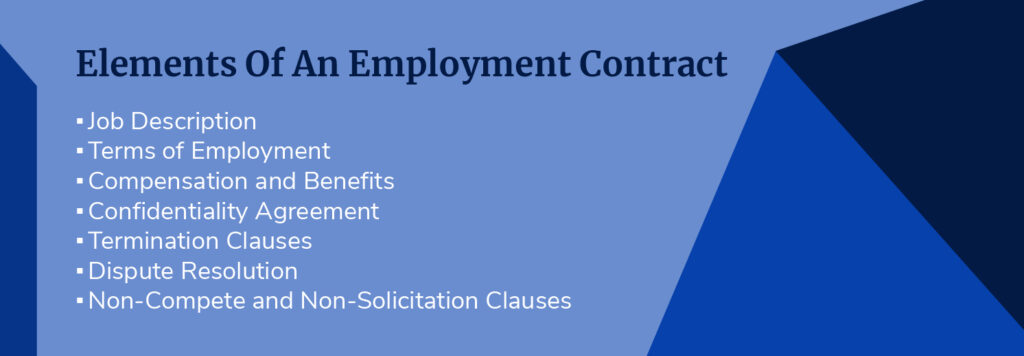Looking for the key to a smooth and fair working relationship? It’s all about having a good employment contract!
But, what is an employment agreement? It’s a document that sets out your job role, your pay, and other important work details.
Whether you’re an employer drafting contracts for your staff, or an employee wondering what to ask for in an employment contract, understanding these agreements is super important.
Join us as we explore seven crucial elements that you should include in your employment contracts.
The Role Of A Contract For Work
A contract for work, or as it’s often referred to, an employment contract, plays a key role in any professional relationship. It sets the parameters of employment, detailing what’s expected of both parties and ensures everything is clear from the get-go.
A well-drafted contract isn’t just one-sided. It protects both employers and employees, defining rights, responsibilities, and the scope of the job. For the employer, it safeguards business interests, preserves confidential information, and sets performance standards. For employees, it clarifies the terms of employment, salary, benefits, and procedures for conflict resolution. A contract of employment can be your best friend, assuring fair treatment and transparent work practices.
Crucial Elements Of Employment Contracts

Job Description
A clear, concise job description is the heart of every employment agreement. It outlines what is expected in the contract for work, guiding employees’ daily tasks and responsibilities.
But how do you formulate this crucial component in standard employee contracts?
Start with the essentials: roles, responsibilities, and performance expectations. Remember, precision and simplicity are your friends. Avoid jargon and focus on clear, plain language.
Crafting an accurate job description in your employment contracts not only helps employees understand their roles better but also serves as a safety net, addressing any future disputes about what to ask for in an employment contract.
Terms Of Employment
Terms of employment refer to the type of work (full-time, part-time or contract) to the number of working hours. It’s more than just standard text in basic employee contracts, it’s the essential blueprint for your professional relationship.
Clearly stating these aspects in your contract for work helps set expectations right, and more importantly, helps in avoiding future disputes.
So, when pondering what to ask for in an employment contract, it’s important to remember that the clearer your employment contracts, the smoother your employment journey.
Compensation & Benefits
Any basic employee contract should clearly define the specifics of salary, bonuses, raises, and benefits. This level of specificity in a contract of employment sets the stage for a fair and transparent relationship between employers and employees. It eliminates potential ambiguities that might lead to misunderstandings or disagreements down the line.
Additionally, a well-drafted compensation and benefits clause in your employment contracts sets a clear expectation of the earnings and perks that come with the job. This not only gives employees a solid understanding of their remuneration but also provides a reference point for future discussions on raise or benefit improvements.

Confidentiality Agreement
A vital component in any standard employee contract is the confidentiality clause. This piece of the contract for work is specifically designed to safeguard a company’s proprietary information. By incorporating this clause into your contract, you create a protective boundary around the company’s valuable assets.
By incorporating a confidentiality clause in your employee contract, you ensure that employees of a business understand the importance of preserving and respecting the business’s proprietary information. This protects a business’s strategic edge, knowing that the information an employee handles is meant for internal use only.
Termination Clauses
When drafting an employment contract, a crucial aspect is the termination clause. The termination clause details the conditions and procedures for ending the working relationship. It’s not just a random entry in standard employee contracts.
Specifying clear-cut parameters for termination in an employee agreement ensures both parties understand the ‘when’ and ‘how’ of possible departure scenarios. By clearly defining the conditions and procedures for ending a contract for work, you help create a transparent and fair workplace. This preemptive approach in your contract for work can prevent legal headaches down the line.
Dispute Resolution
Another crucial aspect you must not overlook is including an effective dispute resolution procedure in your contract for work.
Why is it important, you may ask? A dispute resolution clause acts as a compass guiding the way when disagreements or conflicts arise. It’s a lifesaver in stormy weather, providing a structured process to manage and resolve issues, thus preventing them from escalating into legal battles.
A dispute resolution process should be detailed, clear, and fair. It must outline the steps to be taken when disputes occur, starting with internal mediation, progressing perhaps to arbitration and as a last resort, litigation. Specify who will mediate or arbitrate, how they will be selected, and where it will take place.

Non-Compete & Non-Solicitation Clauses
Non-compete and non-solicitation clauses are components of the standard employee contracts that outline what an employee can and cannot do after leaving a company. Specifically, these clauses are designed to protect the business by preventing former employees from setting up a similar business within a certain period and geographical area (non-compete), or from poaching your clients or current employees (non-solicitation).
Your non-compete and non-solicitation clauses should clearly define the scope of the restriction, its duration, and its geographical coverage, always ensuring they are reasonable and protect legitimate business interests.
Remember, your aim in drafting employee contracts should be to secure a balanced relationship with employees, while also safeguarding a business’s vital assets.
Craft Clear & Fair Employment Contracts Today!
In wrapping up, clear and fair employment contracts are vital in nurturing a prosperous business. It’s not merely about what is in an employment agreement, but how it communicates respect and understanding between parties. As you shape your standard employee contracts, make sure they reflect your core values, fostering a sense of trust. So, when it’s time to draft your next employee agreement, remember these crucial factors for a harmonious professional relationship.





